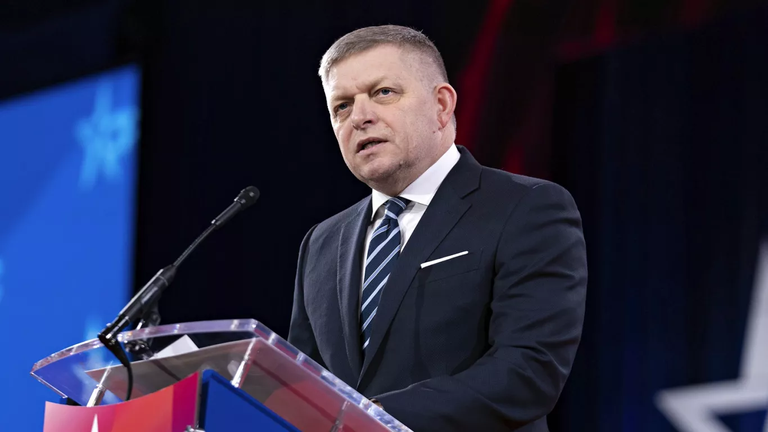Slovakia. Fico rebels against sanctions on Russia and exposes cracks within the EU

Copyright Jose Luis Magana/AP
At the heart of the European Council, while yet another package of sanctions against Russia was being discussed, just one opposing voice was enough to bring down the fragile edifice of unanimity. Slovak Prime Minister Robert Fico said “no” to the 18th sanctions package proposed by Brussels, warning of the risk of irreparable economic damage to his country. And so, once again, the European sanctions front became stuck.
But behind the Slovak rejection lies much more than a technical issue. It is a symptom of a deep division within Europe, stretching from East to West, North to South, between war hawks and pragmatist doves, between those who dream of the total containment of Moscow and those who are terrified of the boomerang effect of Brussels' decisions.
The issue is simple and devastating: Slovakia is almost entirely dependent on Russian gas and has a contract with Gazprom valid until 2034. The Commission's plan to terminate these contracts by 2028, invoking "force majeure," is, according to Bratislava, not only a legal threat but an existential one. Fico warned that a unilateral rupture of the agreement could cost Slovakia billions of euros in international arbitration. He also called loudly for compensation.
“This proposal would economically destroy us unless concrete compensatory measures are guaranteed,” he said, pointing not at Russia, but at Brussels. This choice flips the dominant narrative, showing that for some member states, the real problem is not the war in Ukraine but the price of loyalty to European sanctions ideology.
The 18th package presented by the Commission particularly targets the Russian energy and financial sectors, in an attempt to further isolate Moscow after the rejection of the ceasefire proposed by Washington. But without the unanimity of the 27, any measure remains in limbo. The Slovak veto – tacitly or actively supported by Budapest – has frozen the process.
This is not the first time Europe has found itself hostage to its own decision-making mechanisms. But today the context is different: time is running out, the war is chronicizing, economies are faltering, and the patience of governments under popular pressure, especially in countries most exposed to energy dependency, is wearing thin.
In a summit described as "constructive but inconclusive," Fico met with Ursula von der Leyen, asking for a pact: no new sanctions until shared solutions are found regarding energy supplies and contractual responsibilities. The message is clear: Slovakia will not accept top-down decisions that condemn it to recession. "Let's define the solution first, then let's discuss sanctions," Fico said in a video posted on social media, sounding more like an opposition leader than a member of the EU.
The Commission, pressured by Poland, which wants to close the file before the end of its rotating presidency, promised to send a technical delegation to Bratislava. But time is running out for everyone. Each delay strengthens the dissenting front. Each imposition fuels the nationalist rhetoric.
The Slovak case is not an isolated one. For months, Hungary and Slovakia have acted as the Union's handbrake on matters concerning Ukraine and Russia. But not out of affinity with Putin, rather for internal political and economic survival. For Budapest and Bratislava, the balance between loyalty to the West and protection of national interest has become a daily exercise.
This tension demonstrates that Europe is not (yet) a geopolitical power. It is a mosaic of divergent interests, held together more by rhetoric than by strategic cohesion. As long as every decision requires unanimity, the veto right will be the preferred tool for those who want to negotiate, obtain, and resist. And through continuous compromises, the risk is that sanctions will become symbolic, cracks will widen, and the anti-Russian front will lose its coherence.
https://www.reddit.com/r/europe_sub/comments/1lo22zt/slovakia_fico_rebels_against_sanctions_on_russia/
This post has been shared on Reddit by @davideownzall through the HivePosh initiative.